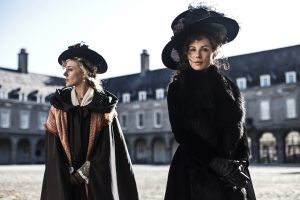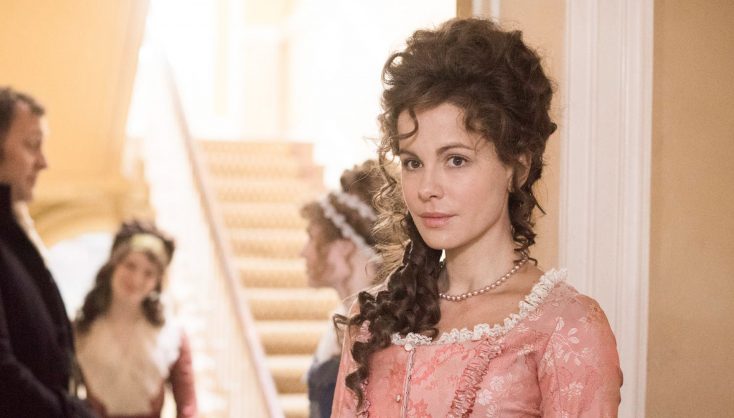
(l-r) Chloe Sevigny and Kate Bekinsdale star in LOVE & FRIENDSHIP. ©Amazon Studios/Roadside Attractions. CR: Ross McDonnell.
By ANGELA DAWSON
Front Row Features
HOLLYWOOD—Imagine “Absolutely Fabulous” besties Edina Monsoon and Patsy Stone transported to late 18th century England and you get some idea of what quirky filmmaker Whit Stillman (“The Last Days of Disco”) has come up with for his new period comedy “Love & Friendship. ” Stillman wrote and directed the work, based on the early Jane Austen novella “Lady Susan.”
Starring as self-serving, scheming yet endearing Lady Susan Vernon is Kate Beckinsale (the “Underworld” films), with Chloe Sevigny (HBO’s “Big Love”) as her friend and co-conspirator Alicia Johnson, the comedy focuses around the newly widowed Lady Susan (Beckinsale) who moves into the country estate of her in-laws to cool her heels as she waits for rumors to subside about her alleged infidelities. As she settles in, Lady Susan decides to find a wealthy match for her troublesome teenage daughter Frederica (Morfydd Clark). But Lady Susan’s plans are not welcomed by the family of the intended suitor. The situation is further complicated with the arrival of a silly but cheerful—not to mention extremely wealthy—Sir James Martin (Tom Bennett, who nearly steals the film).
Beckinsale, separated from director Len Wiseman and who has a daughter with actor Michael Sheen, spoke about reteaming with Stillman and Sevigny, having previously collaborated with them on the 1998 dramedy “The Last Days of Disco.”
Q: You have to deliver a great deal of dialogue in this fast-paced comedy. When you read the script, did that seem daunting to you?
Beckinsale: The thing I was concerned about the most was I knew we had 27 days to shoot the movie, which is not much when there’s so much talking and especially when so much of the talking is me. Before we started shooting, I kept harassing Whit for a locked-in shooting draft because I had that notion of when you rehearse a play, quite often I do Shakespeare plays and you turn up knowing the lines, and he was very coy about that.
Then I realized it’s because he likes to change stuff on the day (of shooting). That was a bit more challenging on this than it can be on some (film shoots), because a great big speech like that that gets moved around is like a mental agility test. By the end of the movie I was pretty sure I didn’t have Alzheimer’s. Actually, we finished it in 26 days because I was good at learning my lines. I saved them a day. I actually was very pleased about that.
Q: This seems almost like a companion piece to one of your early films “Cold Comfort Farm.” Was there something that you found that there were some similarities at all, or the character?
Beckinsale: My character in “Cold Comfort Farm” was very obsessed with Jane Austen. She was sort of fan girl-ing Jane Austen hard in that movie. I really am attracted to those characters that people don’t like that often, which are women who are not necessarily women you want to go on holiday with for two weeks but that you’re kind of fascinated watching, because they’re difficult or tricky and they’re meddlesome. Flora Poste (from “Cold Comfort Farm”) is such a busybody. Lady Susan is sort of ruthless. You want to cheer them on, rather than hang out with them. I’m quite attracted to that. Whit’s very good at writing those women.
Q: What’s Whit’s directing style?
Beckinsale: He’s very allergic to acting with a capital “A”, which I am as well. That’s lucky. I think he picked actors who were into nuance like that. Even the broader parts of the movie, which is Tom Bennett, he arrived with such a complete character that even though it’s rather an extreme character still everything feels very, very natural and real, just really funny. Whit’s very dignified. He’s very dignified and rather diffident and acutely aware of nuance. He can be quite brutal with his direction sometimes. He’s not shy of saying, “I really don’t like that,” but he says it so eloquently, and he’s always right. He and I had talked and emailed so much leading up to it, I think we were pretty much on the same page by the time we started shooting.
Q: Were you familiar with the novella before you read the script?
Beckinsale: Not at all. In fact when I was sent the script, I remembered when I had done “Emma,” there was a writer in England who had written a sort of sequel to “Emma” and there was a fashion at that time for people writing in the style of Jane Austen and selling a book. I just assumed that’s what Whit had done, because it seemed so atypical of a romantic literature heroine. I kept thinking, when is she going to get punished? When is she going to die? Should there be any moral of the story? Then reading the novella afterwards, she’s even more extreme with her daughter than she actually is in our movie. Whit toned it down a little bit.
Q: A lot of your fans know you from the “Underworld” action films, but your sharp comedic timing in this film is evident. How do you feel about doing comedy?
Beckinsale: That’s my absolutely favorite thing. I felt like that’s where I started out and I felt very comfortable that that was my zone and then I thought I’d better mix it up a bit and play somebody a bit tougher. Then that really took off, the thing I was doing as an experiment, to see if I could do it. It got a much bigger life of its own than I anticipated. I think people then started associating me with a machine gun a bit more than what I’m used to doing. It’s been an interesting journey with that. But it’s very nice to come back and go, “Ah, yes.” This is where I feel like, my little birds in the birdbath. Back to normal.
Q: As the mother of a teenage daughter in real life, is it difficult to control her? Did the challenges Lady Susan faces as a mother ring a bell with you?
Beckinsale: My daughter’s 17 now. She’s driving. When you say “control,” I picture a horse with the saddle off raging through the desert. That’s what it feels like. No, she’s really good. She’s a good kid. It’s a very important time to individuate and separate whilst also having the feeling that you’re safe. I think your role as a parent becomes a bit more hands off. You’re sort of required to be a body that sits boringly in the house, if required. Do you know what I mean? You don’t want to be inserting yourself in to all of their experiences all the time, but at the same time you can’t detach and not be there, like Lady Susan. It’s a different sort of balance, and who knows if any of us are getting it right, but I’m definitely not like Lady Susan, so that’s something. I don’t think she’s particularly interested in being a parent. She’s not a natural mother and her daughter’s more than anything a bit of an inconvenience. I think if she were transplanted to now, I’m not sure Lady Susan would be rushing to have a child.
Q: You are doing one more “Underworld,” right?
Beckinsale: I’ve done one.
Q: Right, but if that’s the last one how would you like that to end your legacy?
Beckinsale: Oh, that sounds like a funeral.
Q: No. Not your entire legacy but of that journey. If that’s your last one, how do you feel about how it ends?
Beckinsale: I thought the first one was my last one. (She laughs.) Every single time I’ve done one people say, “Are you doing any more?” and I go, “I don’t think so” and so I don’t tend to think about it in terms of what number, apart from it was quite fun that we got to do quite a few.
Q: What’s next for you?
Beckinsale: I am writing a screenplay with a writer friend of mine. I bought the rights to a book a couple of years ago and so that’s what I’m doing.
Q: Are you going to produce it?
Beckinsale: Yeah. I’ll be in it too.
Q: What can you say about it?
Beckinsale: I don’t know. I may have to check with the other producer if I’m allowed to talk about it.
Q: is it a period piece or is it contemporary?
Beckinsale: It’s period in the sense of it’s set in the late 70s-early ’80s.





